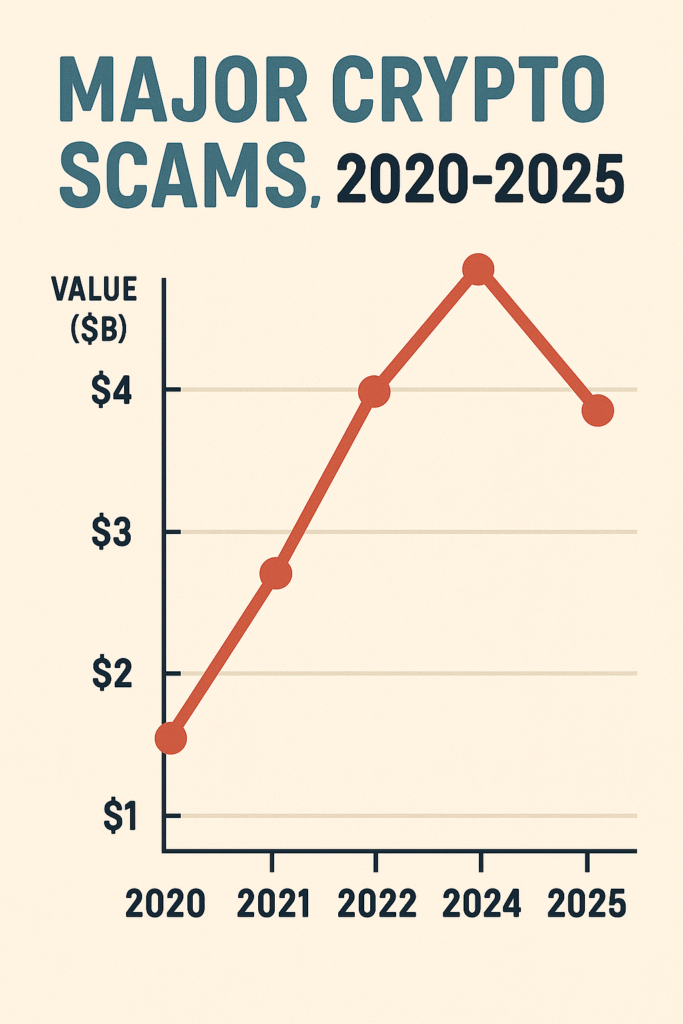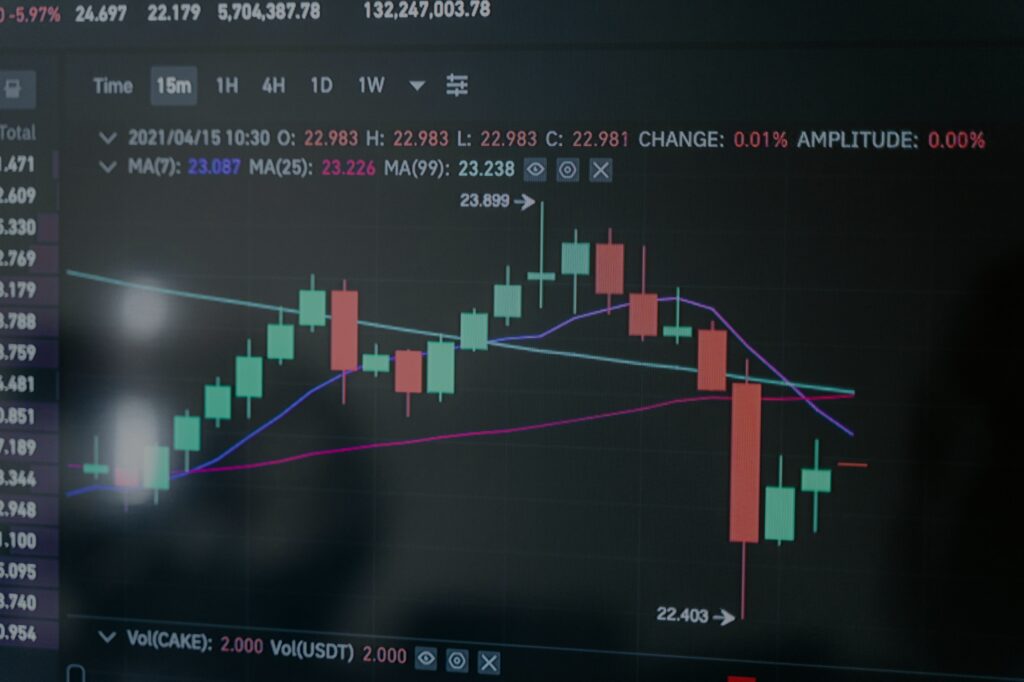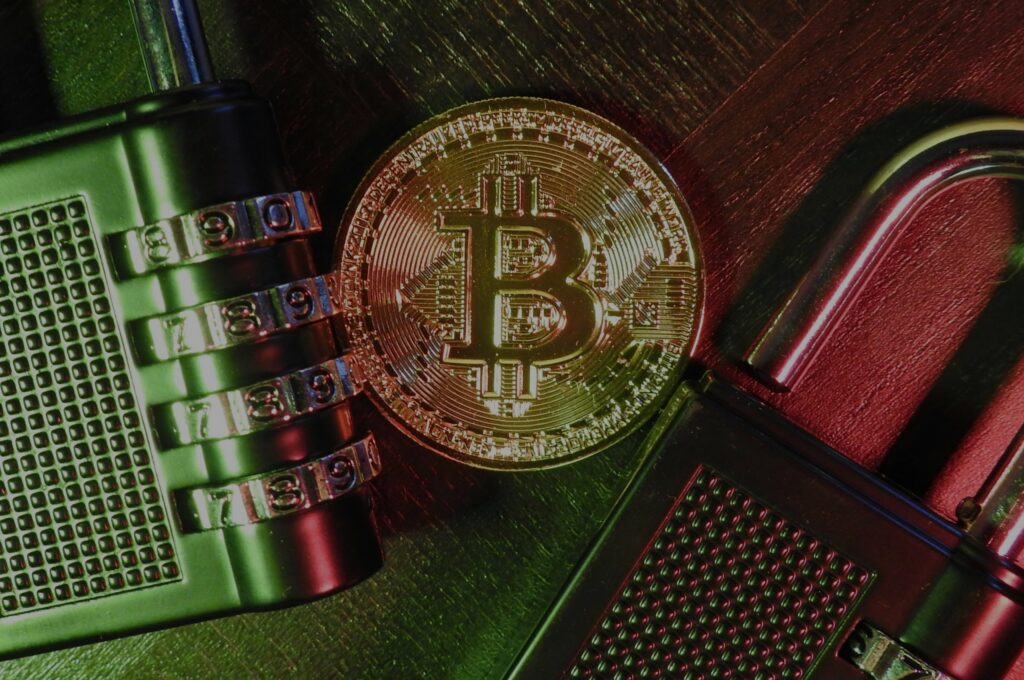Cryptocurrency is exciting, right? It’s like the Wild West of finance full of opportunity, innovation, and the chance to grow your money faster than traditional investments. But let us be real; where there is gold, there are bandits. Crypto scams are everywhere, and they are getting sneakier by the day. In 2023, over $37.4 billion was lost to crypto fraud. Yikes!
Table of Contents
If you are new to crypto, this guide is your trusty map to avoid cheap crypto scams. It is straightforward advice to help you protect your hard earned cash.

Why You Can Not Afford to Ignore Crypto Scams
Before we get into the details, let us talk about why this matters. Scammers love crypto because transactions are irreversible. Once you send crypto to a fraudster, it is gone forever. No bank can reverse it. No customer service agent can help. That is why education is your best defence.
The 5 Most Common Crypto Scams and How to Avoid Them
Let’s break down the top scams you’ll encounter in 2025. Think of this as your most wanted list for crypto fraudsters.
1. Fake Giveaways (“Hey, It’s Elon Musk! Send Me Crypto and I’ll Double It!”)
You might have seen these on Twitter, YouTube, or TikTok. A hacked celebrity account posts: “Send 1 ETH, get 2 ETH back! Limited time!” Sounds too good to be true? It is.
Real life example: In 2021, hackers impersonated Elon Musk to promote a Bitcoin giveaway scam. Over $2 million vanished in hours.
How to avoid:
- Never send crypto to claim a prize.
- Verify celebrity accounts (look for the blue checkmark).
- Report fake posts to the platform immediately.
2. Phishing Scams (“Congratulations! You’ve Won an Airdrop!”)
You get an email or DM saying you’ve won free crypto. All you need to do is click a link and connect your wallet. But you need to know that thelink is a phishing site designed to steal your login details or private keys.
Red flags:
- Urgent language (“Claim within 10 minutes!”).
- Suspicious URLs (“binance-airdrop.com” instead of “binance.com”).
How to avoid:
- Bookmark official exchange websites.
- Use anti-phishing tools like MetaMask’s phishing detection.
- Never share your seed phrase (more on this later).
3. Rug Pulls (“This New Coin Will Moon Tomorrow!”)

When a new token launches with hype through promotion from some influencers, the website looks slick, and the price skyrockets. Then, poof! The developers vanish, taking everyone’s money with them.
A real life example: The Squid Game token (inspired by the Netflix show) collapsed in 2021, leaving investors with worthless coins.
How to avoid:
- Research the team: Do they have LinkedIn profiles? Past projects that they have carried out successfully?
- Check if the token is audited (look for audits from firms like CertiK).
- Avoid tokens promising “guaranteed returns”.
4. Impersonation Scams (“I’m From Customer Support, Just Share Your Seed Phrase”)

You get a message on Telegram from someone claiming to be a Coinbase support agent. They say your account is compromised and ask for your 12 word recovery phrase. Never, ever do this. Always remember that anyone that have access to your 12 word recovery phrase have access to all your asset
How to avoid:
- Legitimate companies will never ask for your seed phrase.
- Contact support directly through the official app/website.
- Use a hardware wallet (like Ledger) for extra security.
5. Ponzi Schemes (“Join My Crypto Trading Group—Just Pay a Small Fee!”)

These scams promise huge returns if you recruit others. Early investors get paid with money from new victims. Eventually, the scheme will collapse and most people will lose everything.
Red flags:
- Focus on recruiting over the actual product.
- Pressure to invest quickly (“Don’t miss out!”).
How to avoid:
- Steer clear of anything resembling a pyramid.
- Ask: “How does this project actually make money?”
7 Red Flags To Identify Crypto Scams
Scammers are not geniuses; they rely on rushed decisions and FOMO (fear of missing out). Here is what to watch out for:
- Typos and bad grammar: Scam websites often have awkward phrasing.
- Anonymous teams: No photos, LinkedIn profiles, or verifiable experience.
- No whitepaper: Legit projects explain their goals clearly.
- DM pitches: Random strangers offering “investment opportunities” in your inbox.
- Unrealistic returns: “Turn $100 into $10,000 in a week!” Definitely, this is not realistic.
- Pressure to act fast: When you see text like “This offer expires in 10 minutes!”, it is usually a scam.
- Requests for private keys: Your seed phrase is like your wallet’s password; never share it with anyone!

5 Simple Habits To Sustain As A Crypto Trader
1. Use a Hardware Wallet
Hot wallets that are connected to the internet are convenient, but hardware wallets (like Trezor or Ledger) are far safer for storing large amounts of cryptos. Think of it as a vault vs. a piggy bank.
2. Enable Two-Factor Authentication (2FA)
Add an extra layer of security to your exchange accounts. Use an app like Google Authenticator, not SMS (which hackers can intercept).
3. Slow Down
Scammers thrive on urgency. If someone pressures you to invest NOW, walk away. Most of the time it’s a shady deal.
4. Google Everything
Before investing, search “[Project Name] + scam.” Check Reddit, Twitter, and CoinMarketCap for reviews.
5. Trust Your Heart
If something feels off, it probably is and your heart is warning you on it. No investment is worth losing your sleep over.
Conclusion: Stay Curious, Stay Safe
Crypto is an incredible tool, but it is not risk-free. The key is to stay informed, take your time and always constantly do your research. Follow the how to avoid crypto scams we discussed above. Protecting your assets requires vigilance with security measures like two-factor authentication, using a hardware wallet, and avoiding rushed decisions. Scammers exploit urgency and fear but knowledge is your
FAQs
What are the most common crypto scams?
Fake giveaways, phishing scams, rug pulls, impersonation scams, and Ponzi schemes are the top threats.
How can I protect my cryptocurrency from scams?
Use a hardware wallet, enable two-factor authentication, and avoid sharing your seed phrase.
What is a rug pull in cryptocurrency?
A rug pull is when developers of a new token disappear with investors’ money, leaving the token worthless.
Why are crypto transactions irreversible?
Blockchain technology ensures transactions are final and cannot be reversed, making it crucial to double-check before sending funds.
Are all crypto investments risky?
While all investments are risky, thorough research and secure practices can help to minimise potential losses.
Did you find this helpful? Share it with a friend who is new to crypto. Together, we can outsmart the scammers!
Check out these following resources:


